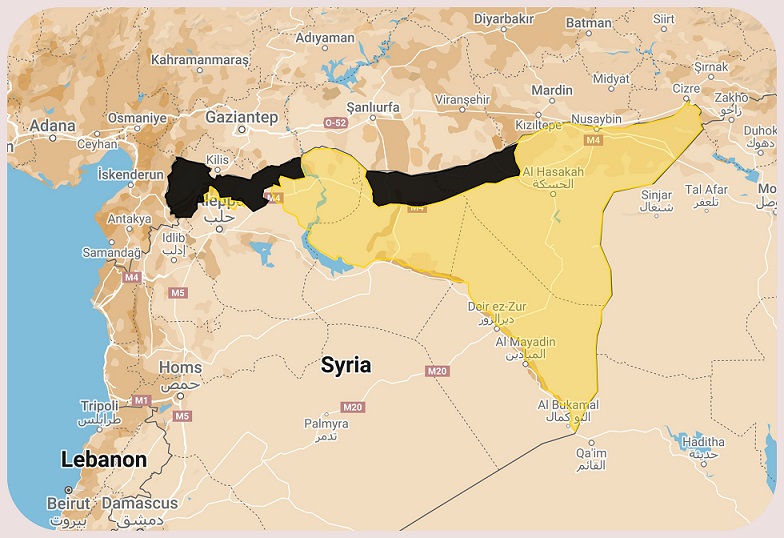Washington Kurdish Institute
By: Dominic Nozzarella | November 28, 2023
The people of Rojava, residing in the Kurdish-majority region of northeast Syria, historically faced oppression under the Baathist regime in Damascus before the 2011 Syrian Civil War. Kurdish rights were severely curtailed, a reality shared by Kurds in Turkey, Iraq, and Iran under their respective national governments. In response to the civil war, Syrian Kurds formed a multiethnic, democratic confederation in northeast Syria for self-defense and mutual aid. During the war, they confronted an existential threat from ISIS, notably during the 2015 battle of Kobani. U.S. intervention provided crucial assistance to the Kurdish-led Peoples’ Protection Units (YPG), leading to a successful counter-attack against ISIS and the reclamation of seized territory.
Since then, the Syrian Kurds, organized under the Autonomous Administration of North and East Syria (AANES), have been key partners with Washington in combating ISIS. Despite the four-year effort to eliminate ISIS’ territorial gains, the Syrian Kurds faced a northern invasion by Turkey. In 2018, Turkey, a U.S. NATO ally, conducted “Operation Olive Branch,” resulting in the occupation of Afrin Canton by Ankara-backed Islamist Syrian militias. Afrin Canton has remained under Turkish-backed occupation, causing significant suffering to its people.
The Turkish government views the YPG and the Kurdish-led administration as the Syrian branch of the Kurdistan Workers’ Party (PKK) and has consistently opposed the U.S.-YPG anti-ISIS partnership. Former President Donald Trump’s decision to withdraw American forces from AANES territory prompted another Turkish invasion, which was reversed after domestic backlash.
Unclear Future
The White House has consistently faced pressure from certain domestic elements and Ankara to abandon the Syrian Kurds in favor of supporting their NATO ally’s position. Washington’s unwavering disapproval of further Turkish incursions into northern Syria and the presence of American soldiers in AANES territory pose the most significant obstacle to Erdogan’s military ambitions in dismantling the Kurdish-led administration on his border. The Kurdish question remains a lingering concern in Washington, particularly given the potential for a second Trump presidency and the adoption of an isolationist “America First” foreign policy. The fate of the U.S.’ relationship with the AANES is uncertain, and it is unclear whether the autonomous zone can withstand the current external and internal aggression without U.S. support.
The AANES not only faces constant threats of ground incursion from Turkey but also experiences continuous bombardment by the Turkish military and its Syrian proxies using drones, airstrikes, and artillery. This devastating campaign targets the Syrian Democratic Forces (SDF) and civilian infrastructure, with a significant escalation in the latter half of 2023, resulting in mass destruction and civilian deprivation in Rojava. By the summer of 2023, the Assad regime and its patron Iran have heightened their antagonism toward the AANES. Pro-Assad and pro-Iran forces have repeatedly infiltrated, attacked, and bombarded the SDF-held portion of the Deir ez-Zor province, attempting to incite an Arab tribal rebellion against the AANES in the hope of restoring northeast Syria to Damascus’ control.
The AANES confronts a blockade, internal strife incited by outside powers, an active ISIS insurgency, and a growing Turkey-Syria-Russia-Iran consensus hostile to Washington and intent on dismantling the Kurdish administration. Abandoning the AANES would not only betray the Syrian Kurds, subjecting them to the tyrannical rule of regional actors, but it would also severely hinder the U.S.’ ability to combat the still-existing and dangerous Islamic State.
Washington’s Imperative
The Syrian Kurds played a pivotal role as the primary fighting force against ISIS, achieving success with U.S. support while maintaining a democratic, secular, multi-ethnic administration in the conflict-ridden heartland of the Levant. Turkey’s anti-Kurdish ambitions are in stark contrast to the Syrian Kurds’ endeavors and contradict the U.S.’ commitment to universal human rights and liberty.
In Afrin, international observers consistently characterize the Syrian rebel and Turkish military occupation as brutally oppressive and exploitative, involving ethnic cleansing against the Kurdish majority. Recent demographic changes imposed by Turkey have resulted in Arabs outnumbering Kurds for the first time since the Crusades. Forced deportations of Syrian Arab refugees to Turkey and the actions of Turkish-backed militias, including exploitation, drug peddling, kidnapping, human trafficking, and killings of Kurdish civilians, paint a grim picture of a reign of terror.
Erdogan’s promises of similar circumstances for the rest of northern Syria, including resettling deported Arabs to create an “Arab belt,” threaten Kurdish national cohesion. Without U.S. intervention, Rojava may face occupation marked by brutal oppression and ethnic cleansing, while the international community and NATO potentially turn a blind eye.
Although the YPG-led Syrian Democratic Forces territorially defeated ISIS in the Levant, the terrorist group persists in the deserts and countryside of northeast Syria, conducting an insurgency to rebuild its capacity for regional and global threats. The constant aggression and pressure on the AANES have hindered its ability to counter the ISIS insurgency, but the SDF remains the U.S.’s most reliable partner in the region for counter-terrorism.
Withdrawal from Rojava would jeopardize U.S. efforts against ISIS, diminish the ability to combat the terrorist group directly, and create opportunities for ISIS to resurge. Additionally, Rojava’s presence impedes Tehran’s efforts to solidify control over the Levant and Iraq. Iran’s anti-Kurdish stance seeks to maintain influence and suppress unrest in Iranian Kurdistan.
Abandoning the Syrian Kurds and their democratic, multi-ethnic experiment risks occupation and subjugation, undermining the U.S.’s ability to combat ISIS. Such abandonment would represent a betrayal of the nearly decade-long U.S.-AANES partnership and the values of universal liberty and self-determination that the U.S. upholds. The U.S. must prevent its reliable anti-terror ally from being subjected to ethnic cleansing and exploitation by the autocratic Turkey-Syria-Russia-Iran consensus.
Dominic is a research assistant at the Washington Kurdish Institute (WKI).
Disclaimer: The views expressed here represent those of the author and not necessarily those of the WKI.

